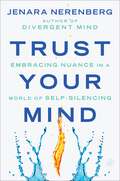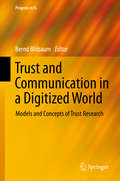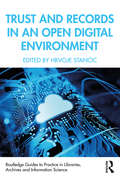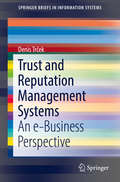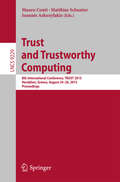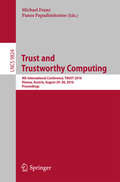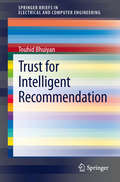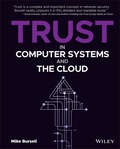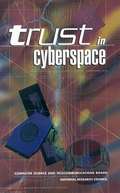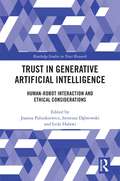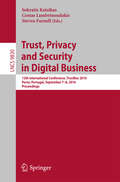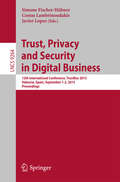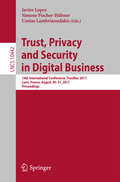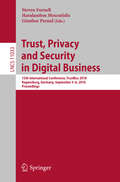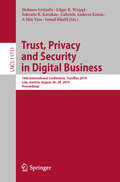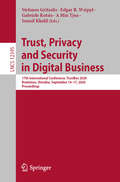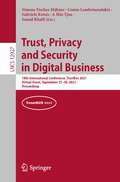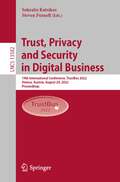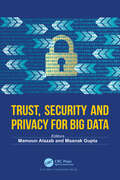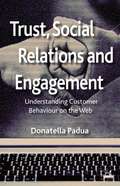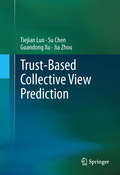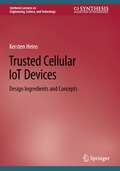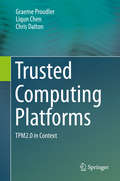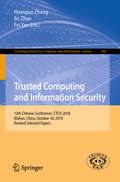- Table View
- List View
Trust Your Mind: Embracing Nuance in a World of Self-Silencing
by Jenara NerenbergAn urgent examination of self-silencing culture and the toxic impact of groupthink, by the author of Divergent Mind and founder of The Neurodiversity Project. Nerenberg empowers readers with tools to understand the mind and navigate an increasingly polarized world, from campuses and workplaces, to the media and beyond.Connected across geography and culture via the internet, the world is both a vast, limitless landscape and an ever-shrinking echo chamber. Communication, especially discourse over free speech, is becoming increasingly divisive; one person’s right to speak comes into conflict with another seeking to prevent harm. Our tolerance for differing opinions is also narrowing. A “wrong” remark or comment, no matter how seemingly innocent, can result in banishment, and contradictory ideas spark hysteria and backlash—what is referred to as “cancel culture.” This polarization affects everyone of us—among friends and families, workplaces and communities—and threatens the fabric of society.In this timely book, Jenara Nerenberg analyzes this phenomenon of “self-silencing,” asking potent questions about how harmful groupthink has become accepted. Applying her expertise in journalism, psychology, and public health, she digs deep into urgent problems that are worsening under a culture of self-censorship, including loneliness, isolation, and polarization.But there is hope. Nerenberg offers insights for how to identify and escape groupthink and transform fear into empathy, allowing space for authentic communication that reduces—rather than causes—harm to others.
Trust and Communication in a Digitized World
by Bernd BlöbaumThis book explores models and concepts of trust in a digitized world. Trust is a core concept that comes into play in multiple social and economicrelations of our modern life. The book provides insights into the current stateof research while presenting the viewpoints of a variety of disciplines such ascommunication studies, information systems, educational and organizational psychology,sports psychology and economics. Focusing on an investigation of how the Internetis changing the relationship between trust and communication, and the impact thischange has on trust research, this volume facilitates a greater understandingof these topics, thus enabling their employment in social relations.
Trust and Records in an Open Digital Environment (Routledge Guides to Practice in Libraries, Archives and Information Science)
by Hrvoje StančićTrust and Records in an Open Digital Environment explores issues that arise when digital records are entrusted to the cloud and will help professionals to make informed choices in the context of a rapidly changing digital economy. Showing that records need to ensure public trust, especially in the era of alternative truths, this volume argues that reliable resources, which are openly accessible from governmental institutions, e-services, archival institutions, digital repositories, and cloud-based digital archives, are the key to an open digital environment. The book also demonstrates that current established practices need to be reviewed and amended to include the networked nature of the cloud-based records, to investigate the role of new players, like cloud service providers (CSP), and assess the potential for implementing new, disruptive technologies like blockchain. Stančić and the contributors address these challenges by taking three themes – state, citizens, and documentary form – and discussing their interaction in the context of open government, open access, recordkeeping, and digital preservation. Exploring what is needed to enable the establishment of an open digital environment, Trust and Records in an Open Digital Environment should be essential reading for data, information, document, and records management professionals. It will also be a key text for archivists, librarians, professors, and students working in the information sciences and other related fields.
Trust and Reputation Management Systems
by Denis TrčekThis book provides an understanding of the core pillars of trust and reputation systems in electronic business settings. It presents the main existing methods and evaluates them from a managerial point of view. The book outlines the necessary technological environment without entangling the reader in too much technical detail. An implementation roadmap on a strategic and tactical level is given as well as guidance on linking trust and reputation management to existing information systems. Existing standards and solutions like recommendation systems, web services, semantic and big data technologies are put into context to prevent subverting efforts using false ratings, faked identities and other security issues. An outlook into recent and future developments completes the book.
Trust and Trustworthy Computing
by Mauro Conti Matthias Schunter Ioannis AskoxylakisThis book constitutes the refereed proceedings of the 8th International Conference on Trust and Trustworthy Computing, TRUST 2015, held in Heraklion, Crete, Greece, in August 2015. The 15 full papers and 3 short papers presented in this volume were carefully reviewed and selected from 42 submissions. They were organized in topical sections named: hardware-enhanced trusted execution; trust and users; trusted systems and services; trust and privacy; and building blocks for trust. There are 7 two-page abstracts of poster papers included in the back matter of the volume.
Trust and Trustworthy Computing
by Michael Franz Panos PapadimitratosThis book constitutes the refereed proceedings of the 9th International Conference on Trust and Trustworthy Computing, TRUST 2016, held in Vienna, Austria, in August 2016. The 8 full papers presented in this volume were carefully reviewed and selected from 25 submissions. Topics discussed in this year's research contributions included topics such as anonymous and layered attestation, revocation, captchas, runtime integrity, trust networks, key migration, and PUFs. Topics discussed in this year's research contributions included topics such as anonymous and layered attestation, revocation, captchas, runtime integrity, trust networks, key migration, and PUFs.
Trust for Intelligent Recommendation
by Touhid BhuiyanRecommender systems are one of the recent inventions to deal with the ever-growing information overload in relation to the selection of goods and services in a global economy. Collaborative Filtering (CF) is one of the most popular techniques in recommender systems. The CF recommends items to a target user based on the preferences of a set of similar users known as the neighbors, generated from a database made up of the preferences of past users. In the absence of these ratings, trust between the users could be used to choose the neighbor for recommendation making. Better recommendations can be achieved using an inferred trust network which mimics the real world "friend of a friend" recommendations. To extend the boundaries of the neighbor, an effective trust inference technique is required. This book proposes a trust interference technique called Directed Series Parallel Graph (DSPG) that has empirically outperformed other popular trust inference algorithms, such as TidalTrust and MoleTrust. For times when reliable explicit trust data is not available, this book outlines a new method called SimTrust for developing trust networks based on a user's interest similarity. To identify the interest similarity, a user's personalized tagging information is used. However, particular emphasis is given in what resources the user chooses to tag, rather than the text of the tag applied. The commonalities of the resources being tagged by the users can be used to form the neighbors used in the automated recommender system. Through a series of case studies and empirical results, this book highlights the effectiveness of this tag-similarity based method over the traditional collaborative filtering approach, which typically uses rating data. Trust for Intelligent Recommendation is intended for practitioners as a reference guide for developing improved, trust-based recommender systems. Researchers in a related field will also find this book valuable.
Trust in Computer Systems and the Cloud
by Mike BursellLearn to analyze and measure risk by exploring the nature of trust and its application to cybersecurity Trust in Computer Systems and the Cloud delivers an insightful and practical new take on what it means to trust in the context of computer and network security and the impact on the emerging field of Confidential Computing. Author Mike Bursell’s experience, ranging from Chief Security Architect at Red Hat to CEO at a Confidential Computing start-up grounds the reader in fundamental concepts of trust and related ideas before discussing the more sophisticated applications of these concepts to various areas in computing. The book demonstrates in the importance of understanding and quantifying risk and draws on the social and computer sciences to explain hardware and software security, complex systems, and open source communities. It takes a detailed look at the impact of Confidential Computing on security, trust and risk and also describes the emerging concept of trust domains, which provide an alternative to standard layered security. Foundational definitions of trust from sociology and other social sciences, how they evolved, and what modern concepts of trust mean to computer professionals A comprehensive examination of the importance of systems, from open-source communities to HSMs, TPMs, and Confidential Computing with TEEs. A thorough exploration of trust domains, including explorations of communities of practice, the centralization of control and policies, and monitoring Perfect for security architects at the CISSP level or higher, Trust in Computer Systems and the Cloud is also an indispensable addition to the libraries of system architects, security system engineers, and master’s students in software architecture and security.
Trust in Cyberspace
by National Research CouncilWhether or not you use a computer, you probably use a telephone, electric power, and a bank. Although you may not be aware of their presence, networked computer systems are increasingly becoming an integral part of your daily life. Yet, if such systems perform poorly or don't work at all, then they can put life, liberty, and property at tremendous risk. Is the trust that we--as individuals and as a society--are placing in networked computer systems justified? And if it isn't, what can we do to make such systems more trustworthy?This book provides an assessment of the current state of the art procedures for building trustworthy networked information systems. It proposes directions for research in computer and network security, software technology, and system architecture. In addition, the book assesses current technical and market trends in order to better inform public policy as to where progress is likely and where incentives could help. Trust in Cyberspace offers insights into:--The strengths and vulnerabilities of the telephone network and Internet, the two likely building blocks of any networked information system.--The interplay between various dimensions of trustworthiness: environmental disruption, operator error, "buggy" software, and hostile attack.--The implications for trustworthiness of anticipated developments in hardware and software technology, including the consequences of mobile code.--The shifts in security technology and research resulting from replacing centralized mainframes with networks of computers.--The heightened concern for integrity and availability where once only secrecy mattered.--The way in which federal research funding levels and practices have affected the evolution and current state of the science and technology base in this area.You will want to read this book if your life is touched in any way by computers or telecommunications. But then, whose life isn't?
Trust in Generative Artificial Intelligence: Human-Robot Interaction and Ethical Considerations (Routledge Studies in Trust Research)
by Joanna Paliszkiewicz Leila Halawi Ireneusz DąbrowskiTrust in Generative Artificial Intelligence: Human‑Robot Interaction and Ethical Considerations is a comprehensive exploration of the critical role of trust in the rapidly evolving world of AI. Edited by Joanna Paliszkiewicz, Ireneusz Dąbrowski, and Leila Halawi, this book provides a thorough examination of how trust influences the integration and effectiveness of generative AI in various aspects of society. The book spans three main sections, offering insights from international experts across multiple disciplines and a blend of theoretical foundations and practical insights, making it a valuable resource for both understanding and implementing trust in AI systems. Readers will benefit from in‑depth analyses of emerging trends, systematic literature reviews, and case studies on trust in diverse contexts, from social media to healthcare. The focus on human‑robot interaction and ethical considerations provides a nuanced understanding of the psychological and ethical factors at play. Aimed at researchers, practitioners, and policymakers interested in AI, ethics, and human‑robot interaction, this edited collection is also suitable for educators and students in fields related to AI and technology, providing a comprehensive resource for academic study and practical application.
Trust, Computing, and Society
by Richard H.R. HarperThe internet has altered how people engage with each other in myriad ways, including offering opportunities for people to act distrustfully. This fascinating set of essays explores the question of trust in computing from technical, socio-philosophical, and design perspectives. Why has the identity of the human user been taken for granted in the design of the internet? What difficulties ensue when it is understood that security systems can never be perfect? What role does trust have in society in general? How is trust to be understood when trying to describe activities as part of a user requirement program? What questions of trust arise in a time when data analytics are meant to offer new insights into user behavior and when users are confronted with different sorts of digital entities? These questions and their answers are of paramount interest to computer scientists, sociologists, philosophers and designers confronting the problem of trust.
Trust, Privacy and Security in Digital Business
by Steven Furnell Sokratis Katsikas Costas LambrinoudakisThis book presents the proceedings of the 6th International Conference on Trust, Privacy and Security in Digital Business (TrustBus 2009), held in Linz, Austria d- ing September 3-4, 2009. The conference continues from previous events held in Zaragoza (2004), Copenhagen (2005), Krakow (2006), Regensburg (2007) and Turin (2008). The advances in the information and communication technologies (ICT) have raised new opportunities for the implementation of novel applications and the pro- sion of high-quality services over global networks. The aim is to utilize this 'infor- tion society era' for improving the quality of life for all citizens, disseminating knowledge, strengthening social cohesion, generating earnings and finally ensuring that organizations and public bodies remain competitive in the global electronic m- ketplace. Unfortunately, such a rapid technological evolution cannot be problem free. Concerns are raised regarding the 'lack of trust' in electronic procedures and the - tent to which 'information security' and 'user privacy' can be ensured. TrustBus 2009 brought together academic researchers and industry developers, who discussed the state of the art in technology for establishing trust, privacy and security in digital business. We thank the attendees for coming to Linz to participate and debate the new emerging advances in this area.
Trust, Privacy and Security in Digital Business
by Costas Lambrinoudakis Simone Fischer-Hübner Javier LópezThis book constitutes the refereed proceedings of the 12th International Conference on Trust, Privacy and Security in Digital Business, TrustBus 2015, held in Valencia, Spain, in September 2015 in conjunction with DEXA 2015. The 17 revised full papers presented were carefully reviewed and selected from 45 submissions. The papers are organized in the following topical sections: access control; trust and reputation in pervasive environments; trust and privacy issues in mobile environments; security and privacy in the cloud; security policies/usability issues; and privacy requirements and privacy audit.
Trust, Privacy and Security in Digital Business
by Costas Lambrinoudakis Javier Lopez Simone Fischer-HübnerThis book presents the proceedings of the 6th International Conference on Trust, Privacy and Security in Digital Business (TrustBus 2009), held in Linz, Austria d- ing September 3-4, 2009. The conference continues from previous events held in Zaragoza (2004), Copenhagen (2005), Krakow (2006), Regensburg (2007) and Turin (2008). The advances in the information and communication technologies (ICT) have raised new opportunities for the implementation of novel applications and the pro- sion of high-quality services over global networks. The aim is to utilize this 'infor- tion society era' for improving the quality of life for all citizens, disseminating knowledge, strengthening social cohesion, generating earnings and finally ensuring that organizations and public bodies remain competitive in the global electronic m- ketplace. Unfortunately, such a rapid technological evolution cannot be problem free. Concerns are raised regarding the 'lack of trust' in electronic procedures and the - tent to which 'information security' and 'user privacy' can be ensured. TrustBus 2009 brought together academic researchers and industry developers, who discussed the state of the art in technology for establishing trust, privacy and security in digital business. We thank the attendees for coming to Linz to participate and debate the new emerging advances in this area.
Trust, Privacy and Security in Digital Business: 15th International Conference, TrustBus 2018, Regensburg, Germany, September 5–6, 2018, Proceedings (Lecture Notes in Computer Science #11033)
by Steven Furnell Haralambos Mouratidis Günther PernulThis book constitutes the refereed proceedings of the 15th International Conference on Trust, Privacy and Security in Digital Business, TrustBus 2018, held in Regensburg, Germany, in September 2018 in conjunction with DEXA 2018. The 15 revised full papers presented were carefully reviewed and selected from 29 submissions. The papers are organized in the following topical sections: Permission models and cloud, privacy, proactive security measures, and cyber physical systems.
Trust, Privacy and Security in Digital Business: 16th International Conference, TrustBus 2019, Linz, Austria, August 26–29, 2019, Proceedings (Lecture Notes in Computer Science #11711)
by Sokratis K. Katsikas Ismail Khalil A Min Tjoa Stefanos Gritzalis Gabriele Anderst-Kotsis Edgar R. WeipplThis book constitutes the refereed proceedings of the 16th International Conference on Trust, Privacy and Security in Digital Business, TrustBus 2019, held in Linz, Austria, in August 2019 in conjunction with DEXA 2019. The 11 full papers presented were carefully reviewed and selected from 24 submissions. The papers are organized in the following topical sections: privacy; and audit, compliance and threat intelligence.The chapter "A data utility-driven benchmark for de-identification methods" is open access under a CC BY 4.0 license at link.springer.com.
Trust, Privacy and Security in Digital Business: 17th International Conference, TrustBus 2020, Bratislava, Slovakia, September 14–17, 2020, Proceedings (Lecture Notes in Computer Science #12395)
by Ismail Khalil A Min Tjoa Stefanos Gritzalis Edgar R. Weippl Gabriele KotsisThis book constitutes the refereed proceedings of the 17th International Conference on Trust, Privacy and Security in Digital Business, TrustBus 2020, held in Bratislava, Slovakia, in September 2020. The conference was held virtually due to the COVID-19 pandemic. The 11 full and 4 short papers presented were carefully reviewed and selected from 28 submissions. The papers are organized in the following topical sections: blockchain, cloud security/hardware; economics/privacy; human aspects; privacy; privacy and machine learning; trust.
Trust, Privacy and Security in Digital Business: 18th International Conference, TrustBus 2021, Virtual Event, September 27–30, 2021, Proceedings (Lecture Notes in Computer Science #12927)
by Costas Lambrinoudakis Simone Fischer-Hübner Ismail Khalil A Min Tjoa Gabriele KotsisThis volume LNCS 12927 constitutes the papers of the 18th International Conference on Trust, Privacy and Security in Digital Business, TrustBus 2021, held in September 2021 as part of the DEXA 2021 conference. The event was held virtually due to COVID-19 pandemic. The 11 full papers presented were carefully reviewed and selected from 30 submissions regarding advancements in the state of the art and practice of trust and privacy in digital business. The papers are organized in topical sections: Trust Evaluation; Security Risks; Web Security; Data Protection and Privacy Controls; and Privacy and Users
Trust, Privacy and Security in Digital Business: 19th International Conference, TrustBus 2022, Vienna, Austria, August 24, 2022, Proceedings (Lecture Notes in Computer Science #13582)
by Steven Furnell Sokratis KatsikasThis volume LNCS 13582 constitutes the papers of the 19th International Conference on Trust, Privacy and Security in Digital Business, TrustBus 2022, held in August 2022 in Vienna, Austria, as part of the DEXA 2022 conference. The 11 full papers presented were carefully reviewed and selected from 30 submissions regarding advancements in the state of the art and practice of trust and privacy in digital business. The papers are organized in topical sections: Trust; Privacy; Security; Digital business; GDPR; Authenticity-enhancing technologies; Internet of Things; Intrusion detection; Honeypots; Homomorphic encryption;, and Serious games.
Trust, Security and Privacy for Big Data
by Mamoun AlazabData has revolutionized the digital ecosystem. Readily available large datasets foster AI and machine learning automated solutions. The data generated from diverse and varied sources including IoT, social platforms, healthcare, system logs, bio-informatics, etc. contribute to and define the ethos of Big Data which is volume, velocity and variety. Data lakes formed by the amalgamation of data from these sources requires powerful, scalable and resilient storage and processing platforms to reveal the true value hidden inside this data mine. Data formats and its collection from various sources not only introduce unprecedented challenges to different domains including IoT, manufacturing, smart cars, power grids etc., but also highlight the security and privacy issues in this age of big data. Security and privacy in big data is facing many challenges, such as generative adversary networks, efficient encryption and decryption algorithms, encrypted information retrieval, attribute-based encryption, attacks on availability, and reliability. Providing security and privacy for big data storage, transmission, and processing have been attracting much attention in all big data related areas.The book provides timely and comprehensive information for researchers and industry partners in communications and networking domains to review the latest results in security and privacy related work of Big Data. It will serve computer science and cybersecurity communities including researchers, academicians, students, and practitioners who have interest in big data trust privacy and security aspects. It is a comprehensive work on the most recent developments in security of datasets from varied sources including IoT, cyber physical domains, big data architectures, studies for trustworthy computing, and approaches for distributed systems and big data security solutions etc.
Trust, Social Relations and Engagement
by Donatella PaduaIn the Internet Age, horizontal value chains generated by peer-to-peer relationships have to be integrated in economic vertical processes. This means that all institutions, from the economical to the political, to the cultural or technological have to turn their approach into a 'social' one. This doesn't mean embracing a no-profit perspective: indeed it implies designing new trust and engagement strategies to generate positive win-win situations with stakeholders. Through the tools offered by sociology, a specific indication on how to build and measure value out of these strategies is offered by the 'Value for Engagement Model'. Behind the model, the innovative concept of Value for Engagement allows the definition of focused strategies to build value through achieving the stakeholders' commitment and activating emotional ties to the organisation. In this new role of 'pulling' stakeholders, the prerequisite is to be perceived as trustworthy.
Trust-based Collective View Prediction
by Su Chen Guandong Xu Jia Zhou Tiejian LuoCollective view prediction is to judge the opinions of an active web user based on unknown elements by referring to the collective mind of the whole community. Content-based recommendation and collaborative filtering are two mainstream collective view prediction techniques. They generate predictions by analyzing the text features of the target object or the similarity of users' past behaviors. Still, these techniques are vulnerable to the artificially-injected noise data, because they are not able to judge the reliability and credibility of the information sources. Trust-based Collective View Prediction describes new approaches for tackling this problem by utilizing users' trust relationships from the perspectives of fundamental theory, trust-based collective view prediction algorithms and real case studies. The book consists of two main parts - a theoretical foundation and an algorithmic study. The first part will review several basic concepts and methods related to collective view prediction, such as state-of-the-art recommender systems, sentimental analysis, collective view, trust management, the Relationship of Collective View and Trustworthy, and trust in collective view prediction. In the second part, the authors present their models and algorithms based on a quantitative analysis of more than 300 thousand users' data from popular product-reviewing websites. They also introduce two new trust-based prediction algorithms, one collaborative algorithm based on the second-order Markov random walk model, and one Bayesian fitting model for combining multiple predictors. The discussed concepts, developed algorithms, empirical results, evaluation methodologies and the robust analysis framework described in Trust-based Collective View Prediction will not only provide valuable insights and findings to related research communities and peers, but also showcase the great potential to encourage industries and business partners to integrate these techniques into new applications.
Trusted Cellular IoT Devices: Design Ingredients and Concepts (Synthesis Lectures on Engineering, Science, and Technology)
by Kersten HeinsThis book focuses on the impact of secure frontend devices for the Internet of Things (IoT). It explains how to identify vulnerabilities of IoT applications and how to protect them against misuse and attacks. Provided insights will help readers to design a reliable and trustworthy IoT ecosystem ensuring a high level of user confidence and a fruitful deployment. As a starting point, the book provides guidance how to identify risks and potential threats. Then, it explains which countermeasures are available and introduces all major ingredients for an efficient implementation of IoT security measures, e.g. a bullet-proof protection of user privacy and device identities. The author outlines an efficient design approach that combines classical embedded computing with smartcard technology and wireless cellular networking like LTE-M or NB-IoT. The target audience includes industrial professionals and students focusing on low cost design and a fast time-to-market. The book is ideal for engineering-minded IoT project owners to safeguard their business goals.
Trusted Computing Platforms
by Graeme Proudler Liqun Chen Chris DaltonIn this book the authors first describe the background of trusted platforms and trusted computing and speculate about the future. They then describe the technical features and architectures of trusted platforms from several different perspectives, finally explaining second-generation TPMs, including a technical description intended to supplement the Trusted Computing Group's TPM2 specifications. The intended audience is IT managers and engineers and graduate students in information security.
Trusted Computing and Information Security: 12th Chinese Conference, CTCIS 2018, Wuhan, China, October 18, 2018, Revised Selected Papers (Communications in Computer and Information Science #960)
by Bo Zhao Fei Yan Huanguo ZhangThis book constitutes the refereed proceedings of the Chinese Conference on Trusted Computing and Information Security, CTCIS 2018, held in Wuhan, China, in October 2018.The 24 revised full papers presented were carefully reviewed and selected from 73 submissions. The papers are centered around cryptography, systems security, trusted computing, information security, and network security.
